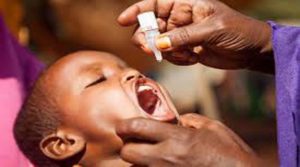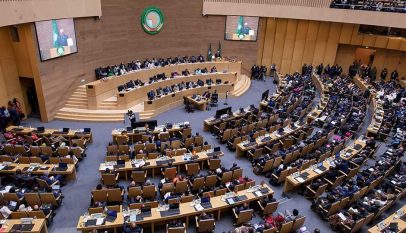Op-ed | Fixing the broken health system in Nigeria, by Isaac Adewole

There has been a resurgence of polio in Nigeria. After nearly two years of relative quiet, the dreaded virus has made a comeback. Four cases were found in Borno state, the epicenter of a devastating war that has caused the deaths of about a 100,000 people, displacement of 1.9 million people, and has left 2.5 million people suffering from severe acute malnutrition. More than 5 million people — including women and children — require food assistance.
One of the initial two reported cases of Wild Polio Virus, or WPV, was detected in Jere. A young girl had travelled two days on foot with her parents from Marte local government on the border of Lake Chad — a part of Nigeria captured and controlled by the Boko Haram terrorists.
Another was detected in Gwoza, on the border with Cameroon.
Nigerian President Muhammadu Buhari acted like an epidemiologist when I broke the bad news to him: He ordered us to go and search, lest we find more cases. Surveillance was heightened; soon, there was a third, then a fourth, which we picked up sometime around August 2016.
To those acquainted with humanitarian work, it is hardly a surprise that wars and conflicts exacerbates the spread of diseases. But these situations however, reveal the trappings of a broken health system, and holds critical lessons and many opportunities, if explored.
Polio is an international public health emergency that gets the world’s attention, but there are other public health disasters. Severe acute malnutrition and common ailments such as malaria, diarhorreal disease and upper respiratory tract infection affect tens of thousands of people.
The Nigerian Humanitarian Response Project, first launched in 2016, is a first for the country. The project was launched as part of the rapid results initiative of the federal government, after the initial health and nutritional emergency that was declared in the north-east states of Adamawa, Bauchi, Borno, Gombe, Taraba and Yobe last August.
Never has Nigeria appreciated the scale and devastating impact of malnutrition as we do during an emergency. Malnutrition contributes to about 50 percent of deaths in children under five, and a loss of about $1.5 billion according to World Bank estimates. About $900 million would be required to address the malnutrition challenge in the country, but the national budget provided only about $12,000 in 2016, no provision in 2015 while about $150,000 was proposed in 2014, but not a single penny was released.
This is in sharp contrast with the release of over $2 million to combat malnutrition in these states at the height of crisis. One of the small victories, I dare say.
The humanitarian crisis takes us back to the basics of what should be the building blocks of a functional health system: Comprehensive policy and guidelines, accessibility, availability, affordability of and demand for care, emergency preparedness, disease prevention and control, routine immunization, logistics and supply chain systems.
Collaboration is one of the pillars upon which the North East humanitarian response is built.
With the government providing leadership, over 60 humanitarian groups marshaled efforts to develop a costed plan and response to meet the critical needs of the people. The collaboration is probably why our response has been among the most effective of interventions from the federal government.
The emergency response plan for Borno state was developed with the engagement of partners and the state government. The Health and Nutrition Emergency Response Plan for Borno State provides an opportunity to extend the operational plan to other states of the country preparatory to health emergencies and/or health challenges resulting from other kinds of humanitarian disasters.
A recent National Health Facility Survey points out opportunities this devastating crisis present. Adamawa state, the second most impacted by the insurgency, recorded the highest proportion of primary health facilities with basic health equipment — edging other states including Lagos, the country’s commercial nerve, the oil-rich Akwa Ibom and the Federal Capital, Abuja. This could only have happened as a result of the collaborative model of our response.
The multisectoral response should represent the ideal situation.
We cannot be treating diarrhoea and vomiting, when in actual fact we should be preventing it. Within the three months in review of our response, the health teams have picked up and treated 3,413 cases of diarrhea, and one could have imagine how much resources devoted to this could have been deployed elsewhere. Though the emergency response has a Water, Sanitation and Hygiene component that should function in conjunction with the Federal Ministry of Water Resources, efforts in this regard has not quite taken off as expected.
It has been 300 days since any case of WPV has been reported in Nigeria. Some part of this could be attributed to our innovative partnership with the Nigerian military. Security operatives have helped to vaccinate children in inaccessible and hard-to-reach areas, while providing timely security information and cover for health workers, thereby facilitating hit-and-run activities in partially accessible areas. The success of this experiment will prove to spur more of such collaborations across the health system.
Finally, that more common ailments are being reported to us is another unlikely success story. Reports from Jere local government area in Borno, revealed an increased presentation of severe malaria cases between the months of March and April 2017. However, careful analysis suggested that the increase in attendance was proportional to the availability of health personnel and (free) medical commodities in the facility. There were no deaths recorded. This scenario aptly captures the universal health coverage agenda of the Muhammadu Buhari administration, which at its core has a mandate to bring health care closer to the poor and vulnerable, which are the most affected by the unsavory health indicators.
If our work is properly done, we expect the health and well-being of our people to improve, though things might appear chaotic for a moment. What we are not prepared for is, to “let this crisis go to waste.”
Isaac Adewole is Nigeria’s health minister and this article was first published on Devex (July 21). The views expressed in this article are the author’s own and do not necessarily reflect African Newspage’s editorial policy.








